“The Nature of Life is to Grow” (15) GHS Sophomores/Juniors
Yesterday we continued exploring what it means to grow up in Goshen Community Schools, as we observed a few classes of sophomores and juniors. We started the morning in Barrett Younghans’ World History class where they were learning about the Arab/Israeli conflict. After doing a quick review of the materials that they had been discussing in the last three class periods, Mr. Younghans had the students get into small groups and open up an educational app called Quizlet on their computers. The app asked the students questions about the information they have been studying and the groups “raced” against the other groups to see who could answer all of the questions (correctly) first.
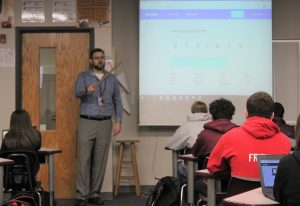
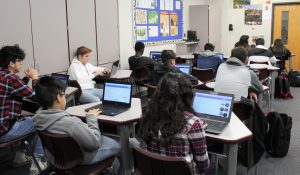
After the first two rounds of the game, Mr. Younghans told the class, “I don’t want to throw shots, but judging by these scores, you might need to study a little bit more.” He asked the students to get into new groups, and they played a couple more rounds, until Mr. Younghans determined that it was time to quit.
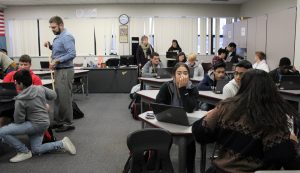
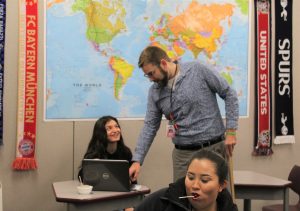
Incidentally, the student pictured below was on every winning team, and they won each round by a lot! Well done, young man!
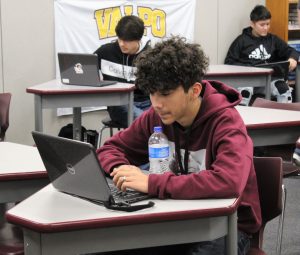
Mr. Younghans directed the students to the screen at the front of the room which displayed a selected reading from his computer, and said that they were going to work on finding the synopsis, or summary, of the reading. “We are going to work on critical reading.” They did one section of the reading, and Mr. Younghans asked for volunteers to summarize what they had read. Following a student’s response, Mr. Younghans said, “Yes, that’s important, but I guess you didn’t really understand what I just said there. Let’s try it again.” When the students understood the assignment, Mr. Younghans told them to work with a partner for two more sections and then to finish the selected reading by themselves. He gave the students 20 minutes to do the assignment, saying “This is a skill you need to learn. You need to learn to read critically.”
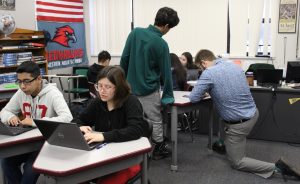
While the students were working on their assignment, Mr. Younghans talked about the the other supporting adults in the room; there was a paraprofessional who works 1:1 with a student, another Special Education teacher was in the classroom to support other students, and an EL (English Learners) collaborator was there to help students who are learning the English language and the World History subject content at the same time.
Mr. Younghans stated that Mildred Orama, the EL collaborator, has been with him in various classes over the years, “and is very good. She probably knows the content as well as I do by now. She is a tremendous asset to the class when I have to be gone and have a sub.” He added that “while we want the EL students to try to read the assignment in English and write their answers in English, Mildred still speaks to the students in Spanish much of the time, especially if they are working in a small group. That is simply to ensure that they understand the content, and the assignments.”
Lastly, Mr. Younghans noted that he and Ms. Orama will look over test answers of EL students, whether the students attempt to answer in English or they need to write in Spanish. The teaching staff will give them credit if they determine that the students know the content, but are struggling to write it correctly in English. What a supportive way to teach students! The staff is giving the students a chance to prove that they know the content, even if expressing their answers in a second language may still be difficult.for them. Learning a new language and subject matter at the same time is not easy, but with support, students can do both.
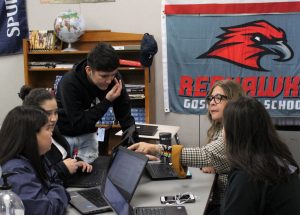
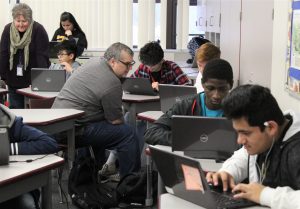
The next stop found us in the English 10 Honors classroom of Lexa Magnuson, where the students were working on a Persuasive Writing unit. The students had just finished reading an article, and Ms. Magnuson asked them “how does the author establish credibility? How does he have the authority to make the argument he makes?”
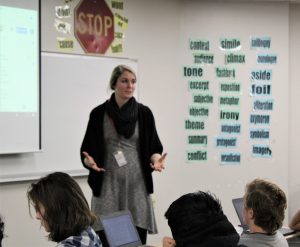
Ms. Magnuson asked the students to choose a Letter to the Editor from several examples, and were then given this assignment: Summarize the article and then answer these questions; Does the author establish credibility? If so, how? If not, what could they have done differently? Is the argument successful?
After the students were done with the short assignment, they discussed their answers with partners and then as a whole class. One answer for establishing credibility included using statistics to prove that the author had done his/her research and knew the topic. Another response from a student indicated that the author had not really established credibility, but then the student offered ideas on how the author could improve upon that.
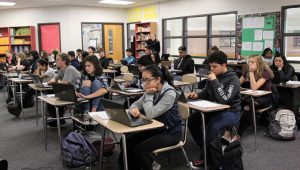
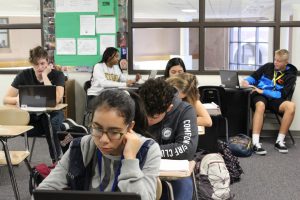
Ms. Magnuson had signs and posters around the room; some that encouraged students what not to use in formal writing, some that included the IB character traits, and also a wall of Harry Potter pictures and posters (probably to encourage students to read!).
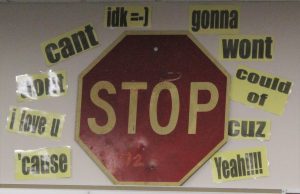
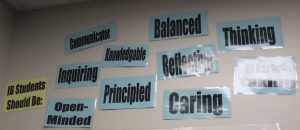
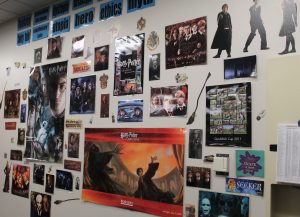
Ms. Magnuson told the students that they would be working on their own Letter to the Editor, and encouraged them to begin thinking about topics on which they could speak authoritatively. “What experiences do you have that give you credibility? We will brainstorm ideas today, and then you will do your research on Friday.” To help the students begin thinking, she had everyone open a new Google doc and start making a list. “Include things like your age, your gender, your grade, your race, your interests, your hobbies, and your experiences. And then think about a topic that you could write about because of your knowledge about the many things you have listed. For instance, you are a student. You could write about things at GHS because you are a student at this high school. You could write about cell phone usage, or other school policies.” Ms. Magnuson asked the students to save their ideas, and to also include one statement: “I am interested in researching (your topic) and finding out the impact that it has on….” or “I want to look more in depth at (your topic).”
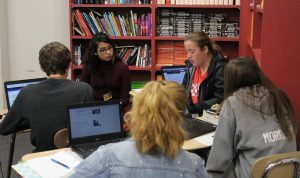
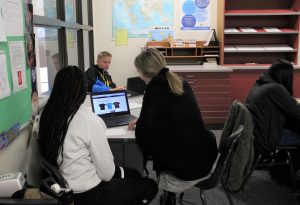
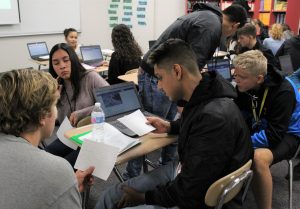
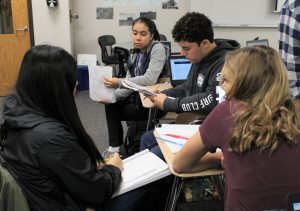
And then class was over, so we made our way down the Whiteman wing to Dana Mehl’s IB History class. (The students were great in the hallway, very polite, but making your way through the halls in the Whiteman wing is no joke, it’s crowded!)
In Mrs. Mehl’s class, they were continuing a discussion on the Arms Race. She asked the students to summarize a video that they had watched during their last class. After several students offered answers, Mrs. Mehl said “if I am grading you on a 15 point scale, you probably just got a 4 or a 5. I need more details from you. I need names of people and names of countries and I need dates. This is the only time we are going to talk about this, and it will be on your IB exam, you need to get this.”
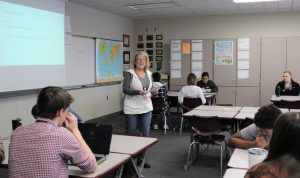
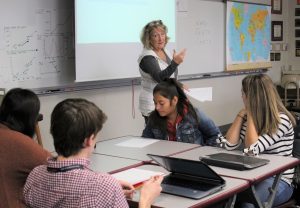
Mrs. Mehl asked the class, “what don’t you know? What didn’t you fully understand? Let’s discuss it further.” The students asked questions, and the discussion hit on topics like nuclear warfare, NATO, the Cold War, the Cuban Missile Crisis, Mutual Assured Destruction (MAD), Reagan and the Strategic Defense Initiative, how much is spent on offensive and defensive weaponry, and the end of the Cold War. Mrs. Mehl ended the discussion by saying “I didn’t know if you got all of this out of the video because it went through everything pretty quickly; that is why we had this discussion.”
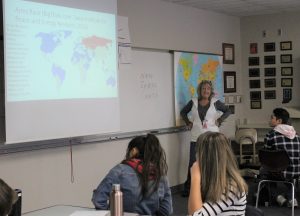
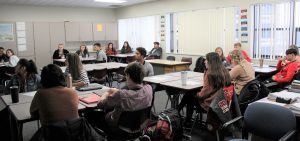
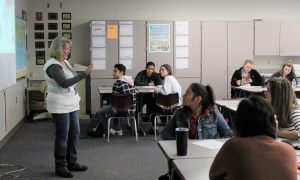
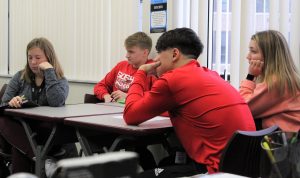
The students then spent time working on their “Historical Investigations” which will be their final exam. Mrs. Mehl reminded them that the Historical Investigations will be due on “December 21st, only 18 school days away.” They discussed when certain sections of the project were due and when they would be checked by Mrs. Mehl, and then the students got to work on their laptops. Mrs. Mehl circulated throughout the classroom to answer questions and offer suggestions.
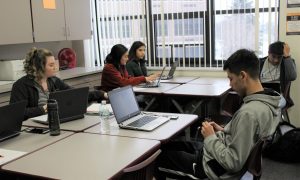
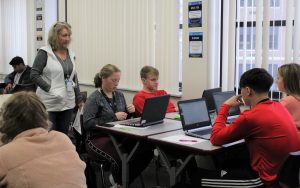
It is easy to see that these sophomores and juniors are continuing to grow, and that they are learning about increasingly in-depth topics. Two other things that were definitely evident in this visit to GHS: the emphasis placed on reading for comprehension, and the instruction for good, solid writing. And those things are not just coming from the English classes. Instead, they are stressed in all classes.
Students who know how to read, summarize, and take notes, and know how to write well are well-prepared for classes at the next level, no matter what that may be for them. GHS principals and teachers often hear back from college students, and those students say that they are glad they were challenged in reading and writing at GHS, because they are better prepared than many of their peers. Thank you, GCS teaching staff, for always striving for excellence!
As always, it was a pleasure to see GCS teachers and students in action. Truth be told, we would go back to school in GHS classrooms any day!
